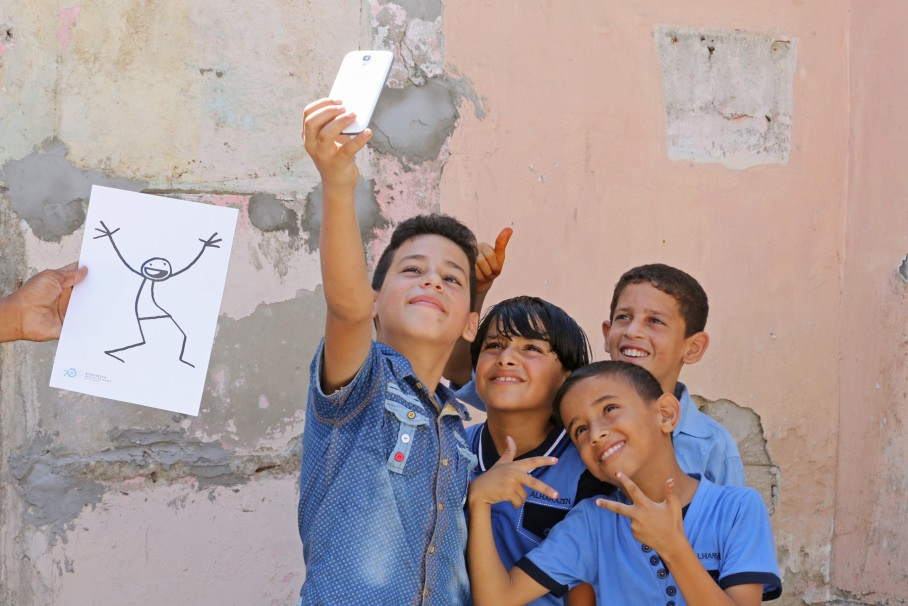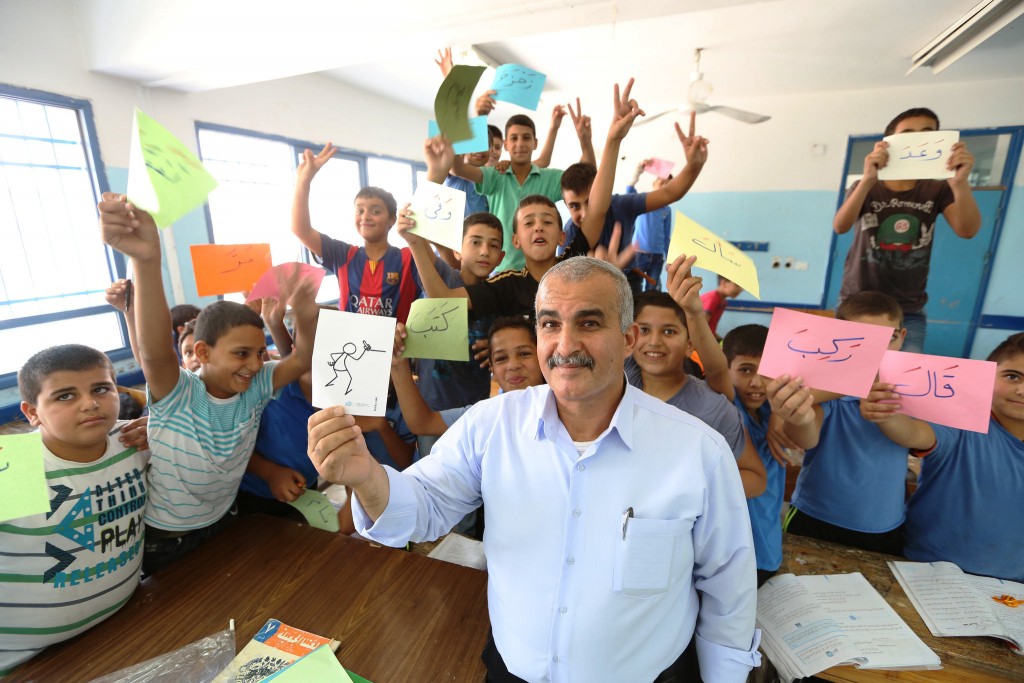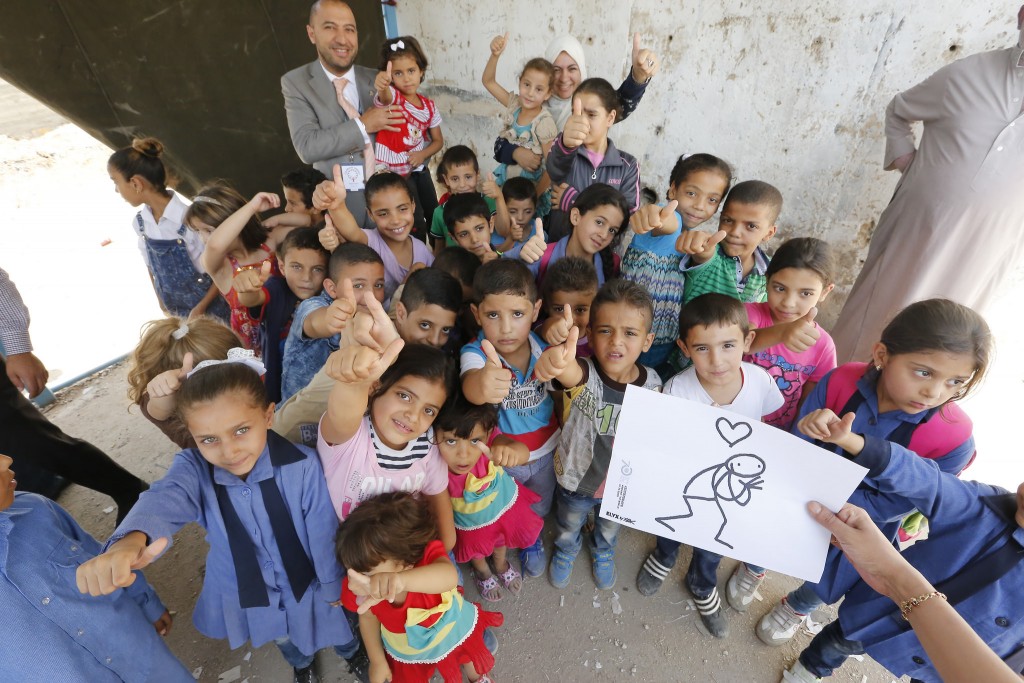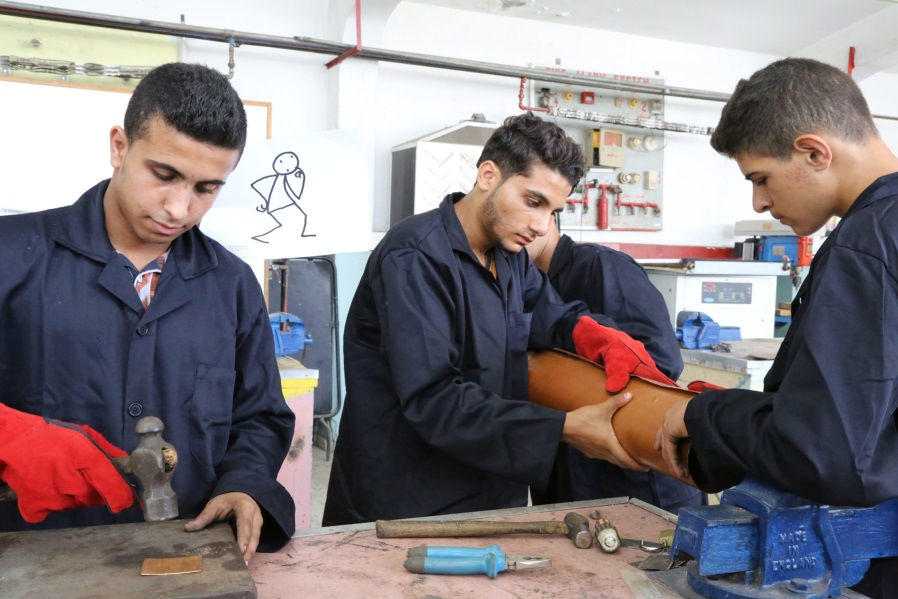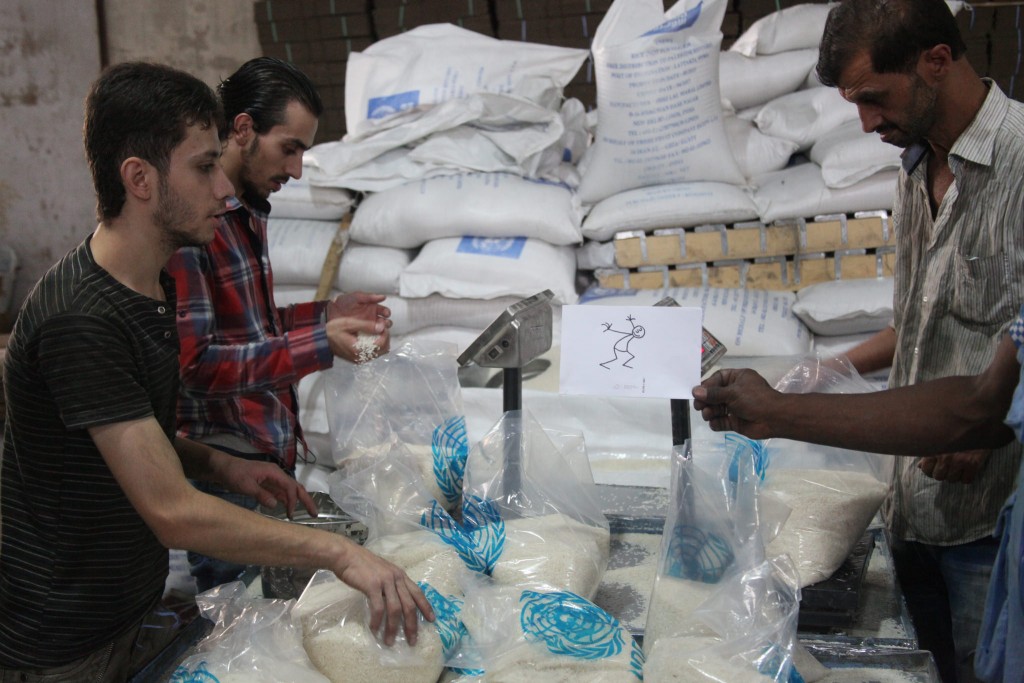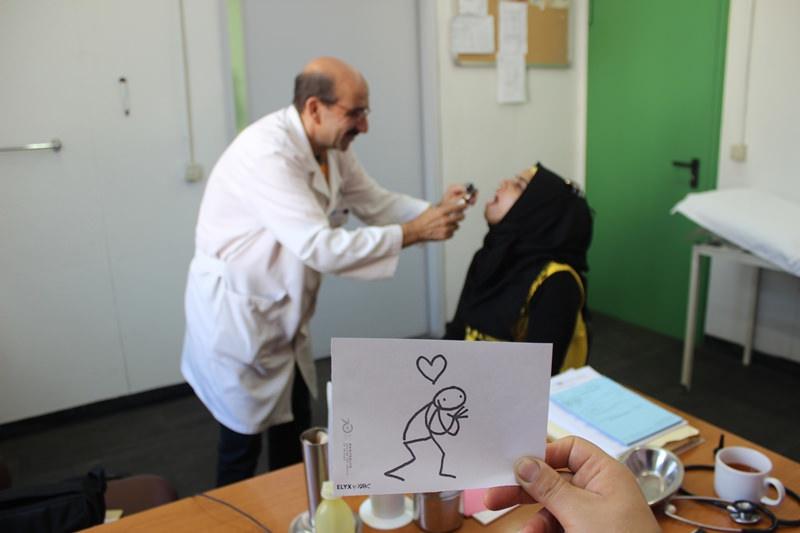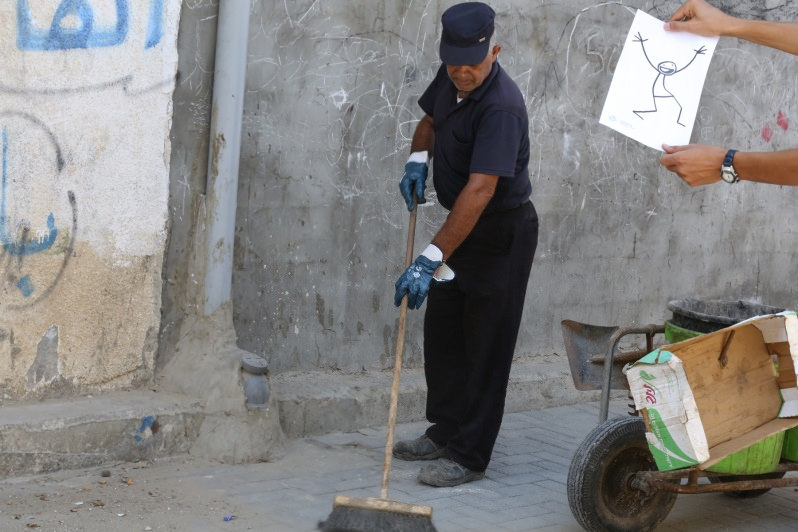Elyx, the UN digital ambassador, arrived in the West Bank today to kick off a five-stop tour to visit the various programmes and services run by the United Nations Relief and Works Agency for Palestine Refugees (UNRWA) throughout the Middle East.
UNRWA was first established by the UN General Assembly on 8 December 1949 with a mandate to carry out direct relief and works programmes for Palestine refugees, who are defined as �persons whose normal place of residence was Palestine during the period 1 June 1946 to 15 May 1948, and who lost both home and means of livelihood as a result of the 1948 conflict.� Descendants of Palestine refugees are also eligible for UNRWA services. The Agency began its operations on 1 May 1950, responding to the needs of about 750,000 Palestine refugees. Today, some 5 million Palestine refugees are registered with UNRWA, representing one of the longest-lasting cases of forced migration in modern history.
Funded almost entirely by voluntary contributions from donor nations, private organizations and individual contributors, UNRWA services encompass education, health care, relief and social services, camp infrastructure and improvement, microfinance and emergency assistance in five fields of operations: Gaza, the West Bank, Syria, Lebanon, and Jordan.
Palestine refugees in each field face a unique set of challenges. In Gaza, thousands of homes were damaged or destroyed in last summer�s conflict, while the ongoing blockade has resulted in unsustainably high levels of poverty and unemployment. In the West Bank, Palestine refugees face severe access restrictions and regular home demolitions as imposed by Israeli authorities. In Syria, the ongoing conflict, now entering its fifth year, has resulted in mass displacement and dispossession, with many Palestine refugees living under inhumane conditions. In Lebanon, Palestine refugees do not enjoy several important rights and are barred from working in as many as 20 professions, while in Jordan, many Palestine refugee camps suffer from high levels of poverty � the recent influx of Palestine refugees from Syria into both countries has greatly strained the capacity of UNRWA and local authorities to deliver services.
Despite these adversities, however, Palestine refugees continue to demonstrate extraordinary resilience. Until a just solution is found for their plight, UNRWA remains committed to helping them achieve their full potential in human development.
Elyx visits Yousef Addawi�s Arabic class at the Dheisheh Basic Boys School near Bethlehem in the West Bank. � 2015 UNRWA Photo by Isabel de la Cruz.
Education is one of the Agency�s core programmes. In its five fields of operations, UNRWA runs 677 elementary and preparatory schools, as well as eight secondary schools in Lebanon, providing free basic education for approximately 500,000 Palestine refugee children. UNRWA students have a strong track record of high educational achievement. According to a recent World Bank study, �Learning in the Face of Adversity: The UNRWA Education Programme for Palestine Refugees� (November 2014), Palestinian students attending UNRWA schools in the West Bank, Gaza and Jordan are achieving higher-than-average results in international assessments, despite the challenging and adverse circumstances they live under.
Elyx hangs out with young students from the Nuzha neighbourhood near Amman in Jordan, who have received school bags and stationery donated by the Chalhoub Group to UNRWA. � 2015 UNRWA Photo.
UNRWA schools have been committed to maintaining gender parity since the 1960s, when UNRWA became the first school system in the Middle East to achieve equal enrolment of male and female students. Since 2000, human rights education has been integrated into UNRWA classrooms to promote non-violence, healthy communication skills, peaceful conflict resolution, human rights, tolerance and good citizenship.
Elyx tries to figure out what these students at the UNRWA Vocational Training Centre in Gaza City are manufacturing. � 2015 UNRWA Photo by Tamer Hamam.
Vocational training and higher education is provided at eight vocational training centres for 7,000 Palestine refugees in all fields and two educational science faculties and teacher-training institutes in the West Bank and Jordan for 2,100 students. Through these institutions, young Palestine refugees develop the skills they need to find sustainable employment and, in many cases, give back to their community. In Gaza, for example, four 16- to 18-year-old Palestine refugee students from the UNRWA Vocational Training Centre in Gaza City successfully developed three different samples of solar heating units that will soon provide affordable, safe and environmentally friendly heating solutions for internally displaced Palestinian families still living in makeshift homes and caravans due to the destruction of their homes during last summer�s conflict.
Elyx stops by a central warehouse in Damascus where staff prepare food assistance parcels for Palestine refugees in Syria, many of whom rely on UNRWA to provide for their minimum daily needs as a result of five years of conflict and displacement. � 2015 UNRWA Photo by Taghrid Mohammad.
The UNRWA Relief and Social Service Programme provides social safety net assistance to the most impoverished Palestine refugees, providing basic food commodities, supplemental cash assistance, skills training and rehabilitation services to ensure that their most basic needs are met. The Agency�s emergency programmes also provide food, cash assistance and shelter to vulnerable Palestine refugees during times of crisis and conflict, such as in Syria, where the ongoing conflict has heavily affected the lives of the nearly half a million Palestine refugees who reside there.
Elyx checks in with the doctor at the UNRWA Beirut Polyclinic in Lebanon. � 2015 UNRWA Photo by Firas Abou Aloul.
The UNRWA health programme provides comprehensive primary health care services directly to 3.5 million refugees in 128 health-care facilities and has seen remarkable results in its 60-year history. In 2006, UNRWA reduced the average infant mortality rate across its areas of operations to 2.2 per cent, surpassing the World Health Organization standard for middle-income countries, while vaccination coverage for Palestine refugee children has been close to 100 per cent for more than a decade. A major reform initiative undertaken in 2011 introduced new approaches to address the changing needs of Palestine refugees, including the Family Health Team, which offers comprehensive primary health care services based on holistic care of the entire family, emphasizing long-term provider-patient relationships and ensuring person-centeredness, comprehensiveness and continuity.
Elyx greets an UNRWA sanitation worker in the Deir El-Balah camp in central Gaza. � 2015 UNRWA Photo by Tamer Hamam.
UNRWA also provides environmental health services, which are managed by different UNRWA departments in different fields. In Gaza, for example, UNRWA sanitation workers operate in all eight refugee camps and greatly contribute to a clean environment for Palestine refugees.
Elyx enjoys a joyful moment with a group of refugee children taking a selfie; the students just finished their class in an UNRWA school in the Deir El-Balah refugee camp in central Gaza. � 2015 UNRWA Photo by Tamer Hamam.
UNRWA established its Infrastructure and Camp Improvement Programme in 2005 to address deteriorating living conditions in Palestine refugee camps. The programme focuses on improving the physical and social environment of the camps through a community-driven planning approach that includes refugees in the planning and design process. UNRWA is currently implementing a three-year long camp improvement pilot project in Deir El-Balah, which houses more than 21,000 refugees. �I am very happy that my camp will be improved, with open places to meet and play with my friends, away from the crowded streets and the cars,� commented 12-year old Mohamed from Deir El-Balah camp. �After this project, this will finally be our camp; the place I love will be a good place for living and playing. Maybe I will write a poem about it when the project is completed.�
UNRWA: United Nations Relief and Works Agency for Palestine Refugees (Official Website)
Learning in the Face of Adversity: The UNRWA Education Programme for Palestine Refugees
UNRWA: Relief and Social Service Programme
UNRWA: Family Health Team
UNRWA: Infrastructure and Camp Improvement Programme
UNRWA: Gaza Strip
UNRWA: West Bank
UNRWA: Syria
UNRWA: Lebanon
UNRWA: Jordan
More Photos from Elyx’s 70 Day Journey (Full Flickr Gallery)

